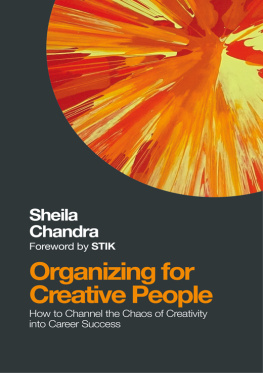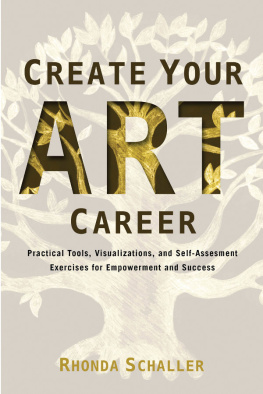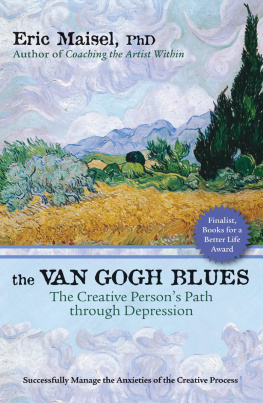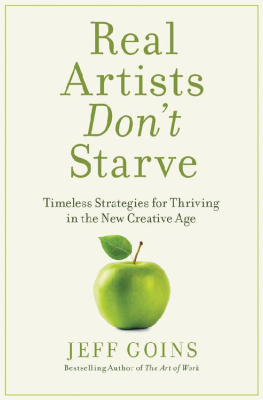Organizing for
Creative People
Organizing for
Creative People
How to Channel the Chaos of Creativity
into Career Success
Sheila
Chandra
Foreword by STIK

To Stik, for whom I wrote the first version of this book, and who inspired me to finish it when I was ready to give up. No one was thirstier for advice than you were when I met you, no one could have run farther with that advice, and no one deserves their huge success more.
Contents
Foreword
When I first met Sheila in 2008 I had been homeless and painting illegally in the streets for many years. I was passionate about my street art. Id even had a few small exhibitions in cafs and squat galleries but had never been to art school. I had no idea about her creative career but she seemed to know her stuff and occasionally gave me friendly tips on how to get focused as an artist. One day after she had casually dropped it into the conversation that she was a singer, I went to the music department at Foyles in Soho to see if I could track down her album. Without looking up, the attendant gestured across the room saying, The Sheila Chandra section is in World Music. She had a section! I was mightily impressed if not a little intimidated by the quality and scale of her artistic achievements, but I now knew that when Sheila gave me artistic advice it was probably worth making notes.
She was still touring and sometimes flew off to do concerts in L.A. As well as singing at festivals around the world, she occasionally came to party with me in the Hackney squat scene where she helped me to separate the creative chaos from the, well, chaos. A while later I learned that she had a chronic condition called Burnt Mouth Syndrome which meant that singing caused her pain and that the condition was getting worse. I didnt see it then, but in hindsight I realize that she was passing me the baton. I had never had anyone take me so seriously and she must have noticed because she started to give me intensive guidance and eventually became my mentor.
Over the next few years Sheila showed me how to turn my art into a career and gave me the infrastructure to handle it as it happened. Our fields were wildly different she was a singer, I was a street artist but her system is transferrable to all disciplines and it transformed my work and my home life as I learned that the two are inseparable. Now I am regularly invited to paint murals in New York and my work is recognized across the globe. In 2015, Foyles of Soho launched my first book of street pieces. They sold all their stock at the signing and gave me my own window display. And I made it into the UK Top Ten hardbacks that week. Sheila had passed the baton to me and now she is passing it to you. Buy this book.
STIK
Introduction
Myth vs magic
I know youre creative and you want to be organized. But before we get to the practical stuff, I want to address the story in your head. You see, the sunny-studio-with-everything-in-its-place image (which Im guessing you aspire to because you picked up this book) is not the only one youll have. It has a darker counterpart; one thats maybe secretly making you feel that being both organized and a creator is impossible. The one about the dysfunctional artist caught up in their own creative chaos. The mindset that will hold you back.
The myth that will damage your career
Maybe youre thinking, But surely being organized is not that important for creative people? After all, that magical creative chaos is key to producing work. Artists of all kinds love chaos! They wouldnt be artists without it.
Some of that is true. But the rest fosters one of the most damaging myths that new and emerging artists labour under: the idea that creative chaos is uncontrollable. And that the chaos itself is the mark of a true artist.
Theres a serious side to being disorganized if youre a creative person. It makes you vulnerable to any manager, agent or gallerist more organized than you. They can easily disempower you, simply because they know more than you do about whats going on in your career. Artists of all kinds have always been all too easy to exploit. In fact, I suspect its those unscrupulous people themselves whove spread the uncontrollable creative chaos myth, simply in order to make creative people more malleable.
The other downside is that youll lose out. On being paid properly and on time. On producing your best work while youre in the mood. On the opportunities that people dont offer you because youre not ready for them or youre a nightmare to work with. Some creative professionals get away with it anyway although they seldom have long careers. Most dont.
Youre worth more than that. And your work deserves better than to be exploited. But Im not going to soft-soap you. You can keep the creative magic, but youre going to have to give up on your chaos myth, and your illusions about being a true artist all dreamy, drugged out, dissolute, dysfunctional and disorganized in order to succeed. (Im not really blaming you; weve all been fed this idea all our lives.) Good artists are smart and hardworking. Its going to take some serious strategy, good infrastructure and copious amounts of hard work for you to win those elusive moments of creative and public glory.
The uncontrollable creative chaos myth is a lie
Dont just take my word for it. If you look at the lives of the most successful artists, youll find that theyre very well organized. Both in terms of their physical spaces and domestic routines, and in terms of the kind of planning and infrastructure it takes to run a successful career. Thats the other side of the tapestry that you seldom see. In addition, because they often work with their bodies, they simply have to take care of themselves. (I challenge you to find a serious singer outdoors without a scarf on, even on a spring day ) So now you know you need to work smart. But how do you get there?
There is another way
Before I set out to write this book, I asked creative people in various fields what kind of organizing support structure they needed. They included writers, musicians, designers, makers and dancers. There was one central theme. I want a system that will carry me from living out of a shoebox to the highest levels of my creative career in fact, one that will help me get there. And I want a way to organize my work and my life that will help me to contain the creative chaos that has to remain at the centre of my work - without stifling it.
If that sounds a bit like the crew of the Enterprise needing to contain the dilithium crystals in the ships warp core, its because working with raw creativity can be a little like that. A force you absolutely need to power your ship, but which is dangerous if it spills out everywhere. (The cores been breached, Captain. I canna hold her )
Creativity is unpredictable. Thats what makes it simultaneously so wonderful and so scary. Its whats responsible for our best work, and we need to keep tapping into it throughout our careers. But we can find ourselves in a bit of a bind because, if it spills over, that very unpredictability can take its toll on our workspaces, schedules, reliability and ultimately our lifestyle, health and career opportunities.
Up until now, creative people of all kinds have been left to work out how to adapt existing systems of organization to the way they work, or to find other ways of doing things, themselves. I hope to change that.
Ive learned the hard way, so you dont have to
Ive worked for 35 years, first as a singer, then as a songwriter, teacher, workshop leader, publisher, copyright trustee and author. Ive had a Top Ten hit around the world, made ten original albums, sung on major film soundtracks, and given workshops and concerts worldwide, all while managing myself and doing the majority of the legal work myself. When I started having the voice problems that stopped me being a singer, Id already experienced the increasing workloads and tight deadlines that most creative people face, and found the most efficient way to work within them without losing that creative spark. In fact, music journalists will tell you that, if anything, my albums got more and more original and innovative as I went on. (I didnt have time to play safe as I knew Id have to stop eventually )
Next page






